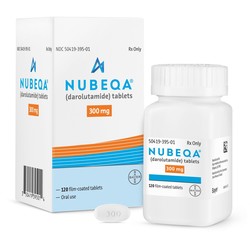Bayer said its second-generation androgen receptor-targeted agent (ARTA), Nubeqa (ingredient: darolutamide), has proven its efficacy in treating metastatic hormone-sensitive prostate cancer (mHSPC).

The company’s announcement follows the results of the ARASENS study, a phase 3 clinical trial of Nubeqa, in the New England Journal of Medicine (NEJM) on Feb. 17.
The ARASENS study compared Nubeqa, androgen deprivation therapy (ADT), and docetaxel combination therapy with placebo, ADT, and docetaxel combination therapy in 1,306 patients with mHSPC.
The primary endpoint was overall survival (OS), and secondary endpoints included time to castration-resistant prostate cancer (CRPC), time to pain progression, first symptomatic skeletal event (SSE), initiation of subsequent systemic antineoplastic therapy, and adverse events.
As a result of the study, the additional combination of Nubeca significantly prolonged overall survival compared to the placebo group.
By Oct. 25, the data cutoff date for the primary analysis, the risk of death dropped by 32.5 percent in the Nubeca group than in the placebo group.
Also, the median treatment duration was longer for the Nubeca group (41.0 months) than the placebo group (16.7 months). The Nubeca group showed consistent benefits for secondary endpoints and pre-specified subgroups while showing consistent benefits for secondary endpoints and no increase in adverse event rates.
“Metastatic prostate cancer is a uniformly fatal disease, and despite progress in recent years, only 30 percent of these men will survive beyond five years,” said Professor Matthew Smith, the director of the Genitourinary Malignancies Program at Massachusetts General Hospital Cancer Center. “ARASENS demonstrated that the addition of darolutamide, an androgen receptor inhibitor, significantly increased overall survival for patients receiving standard androgen deprivation therapy and docetaxel as initial treatment for metastatic hormone-sensitive prostate cancer.”
Darolutamide also improved the time to castration-resistant prostate cancer and other critical secondary endpoints, he added.
Professor Smith stressed that such results are an essential step forward in treating patients with metastatic hormone-sensitive prostate cancer.
Bayer’s head of the oncology strategic business unit Robert LaCaze also said, “With the ARASENS results in mHSPC adding to the existing phase 3 ARAMIS data in non-metastatic castration-resistant prostate cancer (nmCRPC), darolutamide has now shown positive data in two pivotal clinical trials for patients across these key disease stages in prostate cancer.”
The company believes darolutamide can become a foundational drug for appropriate prostate cancer patients and will pursue the fastest possible regulatory timelines, LaCaze added.
Nubeqa is a treatment used in various markets worldwide, including Korea, the U.S., the European Union (EU), Japan, and China, and hospitals currently use the treatment for non-metastatic castration-resistant prostate cancer (nmCRPC) patients with high metastasis risk.

